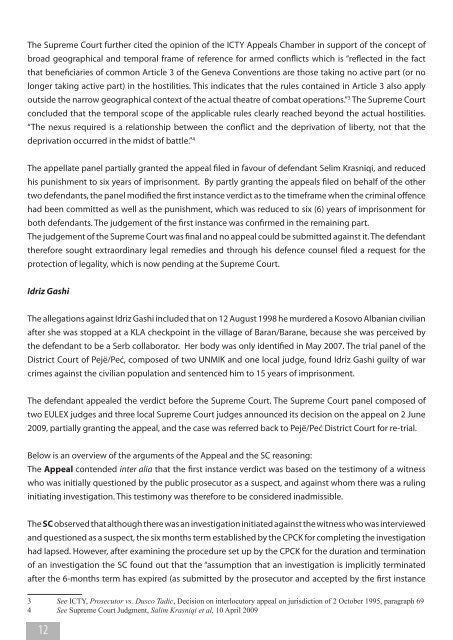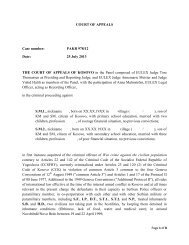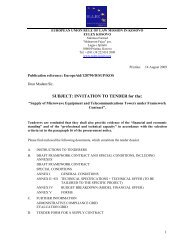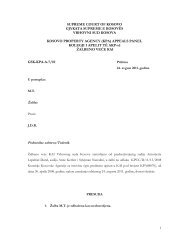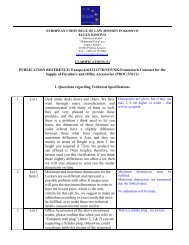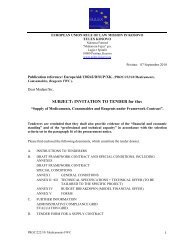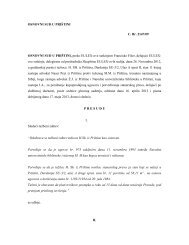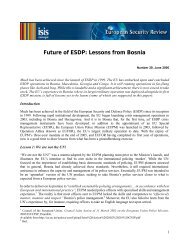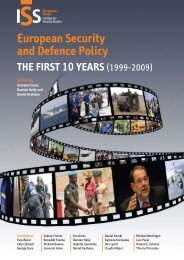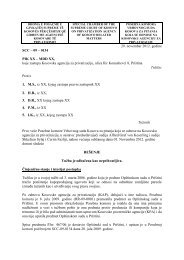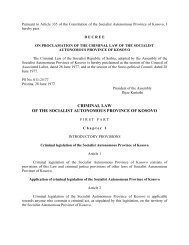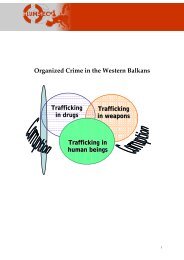English - Eulex
English - Eulex
English - Eulex
You also want an ePaper? Increase the reach of your titles
YUMPU automatically turns print PDFs into web optimized ePapers that Google loves.
The Supreme Court further cited the opinion of the ICTY Appeals Chamber in support of the concept of<br />
broad geographical and temporal frame of reference for armed conflicts which is “reflected in the fact<br />
that beneficiaries of common Article 3 of the Geneva Conventions are those taking no active part (or no<br />
longer taking active part) in the hostilities. This indicates that the rules contained in Article 3 also apply<br />
outside the narrow geographical context of the actual theatre of combat operations.” 3 The Supreme Court<br />
concluded that the temporal scope of the applicable rules clearly reached beyond the actual hostilities.<br />
“The nexus required is a relationship between the conflict and the deprivation of liberty, not that the<br />
deprivation occurred in the midst of battle.” 4<br />
The appellate panel partially granted the appeal filed in favour of defendant Selim Krasniqi, and reduced<br />
his punishment to six years of imprisonment. By partly granting the appeals filed on behalf of the other<br />
two defendants, the panel modified the first instance verdict as to the timeframe when the criminal offence<br />
had been committed as well as the punishment, which was reduced to six (6) years of imprisonment for<br />
both defendants. The judgement of the first instance was confirmed in the remaining part.<br />
The judgement of the Supreme Court was final and no appeal could be submitted against it. The defendant<br />
therefore sought extraordinary legal remedies and through his defence counsel filed a request for the<br />
protection of legality, which is now pending at the Supreme Court.<br />
Idriz Gashi<br />
The allegations against Idriz Gashi included that on 12 August 1998 he murdered a Kosovo Albanian civilian<br />
after she was stopped at a KLA checkpoint in the village of Baran/Barane, because she was perceived by<br />
the defendant to be a Serb collaborator. Her body was only identified in May 2007. The trial panel of the<br />
District Court of Pejë/Peć, composed of two UNMIK and one local judge, found Idriz Gashi guilty of war<br />
crimes against the civilian population and sentenced him to 15 years of imprisonment.<br />
The defendant appealed the verdict before the Supreme Court. The Supreme Court panel composed of<br />
two EULEX judges and three local Supreme Court judges announced its decision on the appeal on 2 June<br />
2009, partially granting the appeal, and the case was referred back to Pejë/Peć District Court for re-trial.<br />
Below is an overview of the arguments of the Appeal and the SC reasoning:<br />
The Appeal contended inter alia that the first instance verdict was based on the testimony of a witness<br />
who was initially questioned by the public prosecutor as a suspect, and against whom there was a ruling<br />
initiating investigation. This testimony was therefore to be considered inadmissible.<br />
The SC observed that although there was an investigation initiated against the witness who was interviewed<br />
and questioned as a suspect, the six months term established by the CPCK for completing the investigation<br />
had lapsed. However, after examining the procedure set up by the CPCK for the duration and termination<br />
of an investigation the SC found out that the “assumption that an investigation is implicitly terminated<br />
after the 6-months term has expired (as submitted by the prosecutor and accepted by the first instance<br />
3 See ICTY, Prosecutor vs. Dusco Tadic, Decision on interlocutory appeal on jurisdiction of 2 October 1995, paragraph 69<br />
4 See Supreme Court Judgment, Salim Krasniqi et al, 10 April 2009<br />
12


